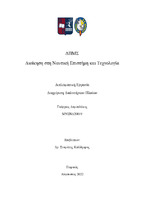Διαχείριση διαλυτήριων πλοίων

View/
Keywords
Ανακύκλωση πλοίων ; Διεθνής συμβάσεις ; Επικίνδυνα απόβλητα ; Νομικό πλαίσιο ; Διαλυτήρια πλοίωνAbstract
Ever since humans have been building ships, ships at the end of their lives they were either burned or sunk, but starting from the 20th century they are being recycled. Today, people encourage industries to recycle their products. So the shipbuilding industry has to contribute to achieve that. Every boat has a certain lifespan and when it reaches the end, actions are needed to dismantle it. Dismantling of ocean-going ships is currently done mainly in a few states of Asia. Due to the hazardous materials contained in the ships, the dismantling constitutes significant risk to both shipyard workers and the environment. The international community is aware of the problems associated with dissolution ships and has tried in various ways to improve practices. In addition, attention has turned to the techniques of waste handling. The prevailing regime contains provisions that control and limit cross-border circulation of waste.
This thesis examines how the industry of scrapping ships works, how the scrapping is done by reviewing the actions they have done so far by different associations that are interested and trying to solve the problems of shipbreaking. Great care was taken in the regulations about the handling of waste and how the regulations can be applied to ships destined for breaking. Of course, the imposition of regulations even today contains some weaknesses.
The Hong Kong Convention must be enforced and respected by all the countries involved in ship breaking. This will ensure that ships, when they are recycled, do not present new risks to human health and to the environment.

